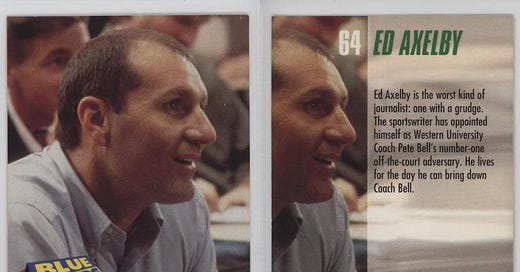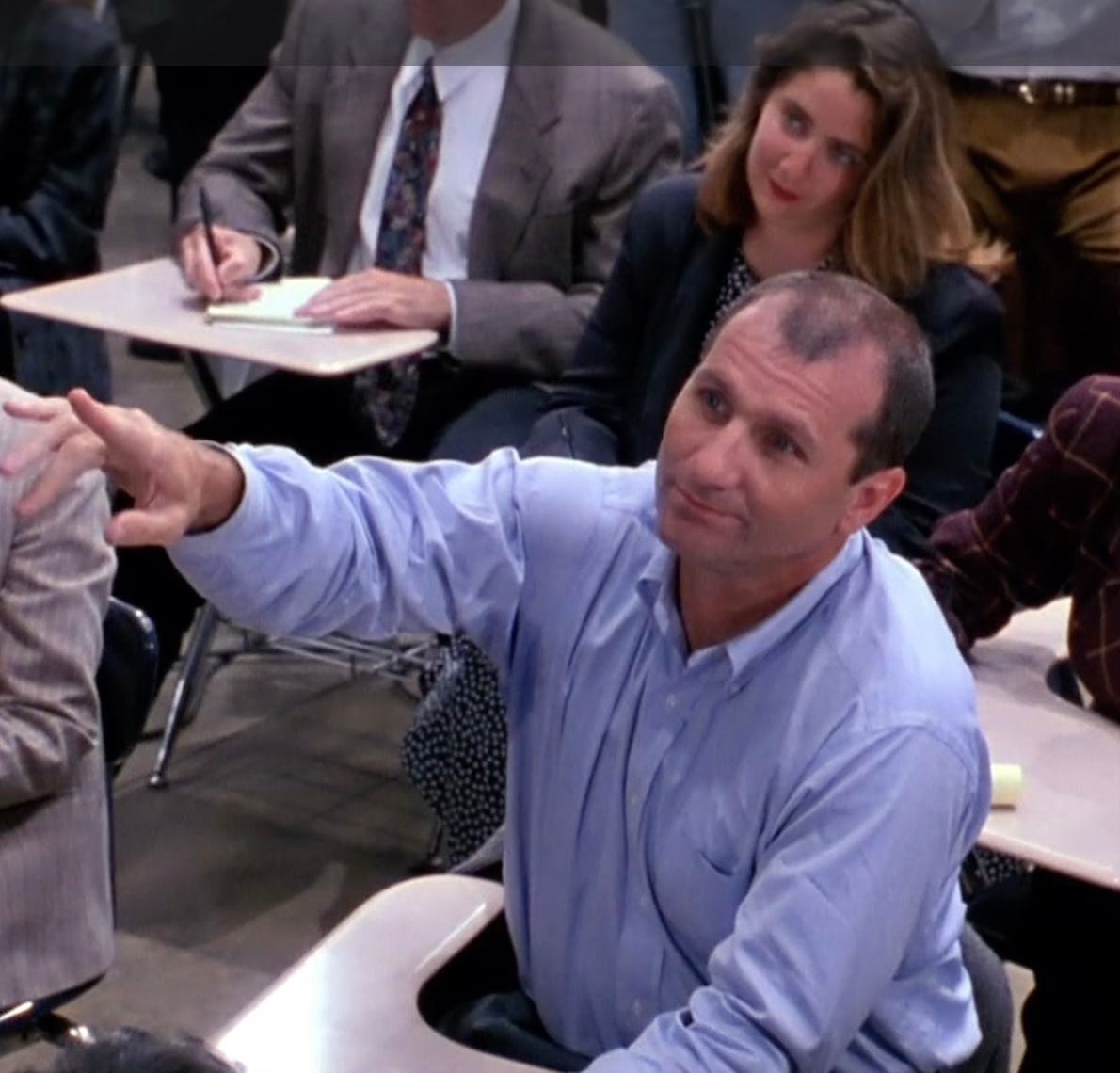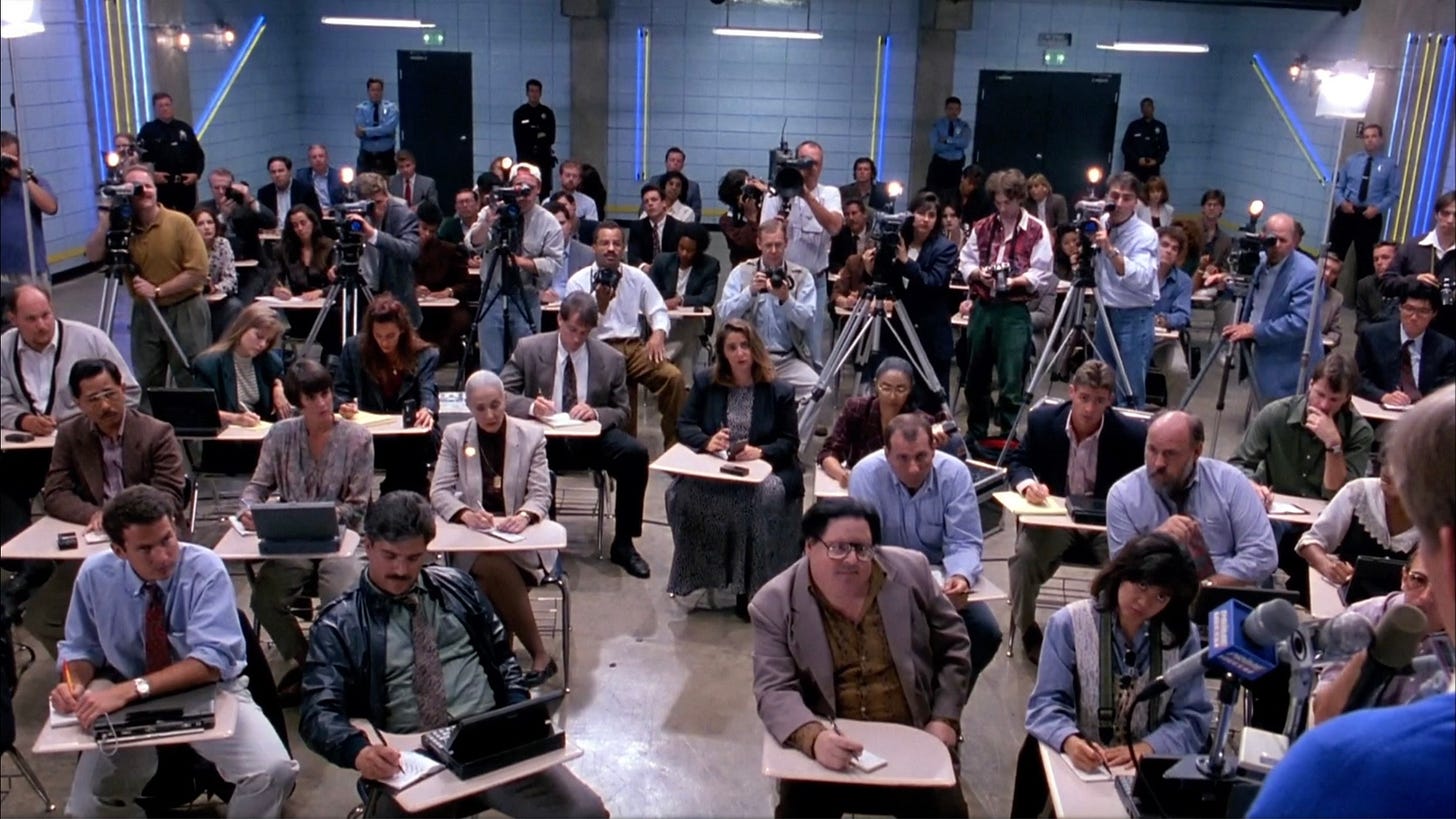Ed Axelby's reporting mistake
A look at the portrayal of sports journalism in the movie "Blue Chips"
Brian’s note: This is the second in an occasional series of posts about the fictional portrayal of journalists. This post was written with the help of Jeremy Hartigan. The real ones know.
Let’s start with one question that’s been bugging me the whole time I’ve been working on this piece.
What newspaper does Ed Axelby work for?
It’s not the most vital question coming out of a rewatch of Blue Chips. But it’s one I can’t shake. We never see or hear what newspaper the reporter writes for. There’s no image of a newspaper with Ed’s column sig or byline. No reference how “that bastard at The Times is out to get me” or whatever. Nothing. The paper is never named.
Anyway, this is a post about the portrayal of Ed Axelby in Blue Chips, and the enormous reporting error he makes in this movie.
If you don’t remember, Blue Chips1 is a 1994 movie written by Ron Shelton2 starring Nick Notle as Pete Bell, the wildly successful and Bob Knight-coded coach of the fictional Western University Dolphins. Bell led the Dolphins to NCSA championships in 1975, 1984, and 1989 but the program has fallen on hard times. The story’s focus is how Bell, presented as a man who would never cheat in recruiting, feels pressured to cheat at recruiting. Led by overzealous booster Happy Kuykendahl3, Western pays all manner of extra benefits to get star recruits Butch McCrea4, Ricky Roe and Neon Boudeaux5. The team returns to winning, including a win over top-ranked Indiana, but Bell is tortured by selling out his principles and quits after delivering a passionate speech at a press conference.
Our focus here is Axelby, a reporter covering Western University. He’s played by Ed O’Neill, who was nearing the end of “Married, with Children” and still a few years out from “Modern Family.”
Ed Axelby is barely in this movie. He has exactly four scenes. He’s on screen for less than five minutes. But like Trent Crimm in Ted Lasso, he plays a pivotal role.
We meet Ed in the movie’s opening minutes. The Dolphins have lost another game, en route to Bell’s first losing season. Bell was ejected from this game after punting a basketball into the crowd while arguing with the refs.
Bell walked into the media room. There’s no podium, just a bank of microphones. Reporters are sitting at desks that look like they came from a history classroom.
“Any questions, stupid or otherwise?” Bell asks, immediately setting up that the coach has an adversarial relationship with the local media. A reporter named Alan asks him about kicking the ball into the stands. “Alan, you used up your question. That was a stupid one.” I don’t know, seems like the obvious first question you’d ask a coach who got thrown out of the game after punting a ball into the stands would be about punting said ball into said stands.
The next question comes from Ed:
Do you think it's fair to say that your inability to get the program back on track is strictly related to recruiting problems that started four years ago after the alleged point shaving incident?
There’s a lot to unpack here. It reinforces that the program was once good but as fallen on hard times, and introduces an alleged point-shaving scandal, which will prove to be a key plot point.
It’s a harsh question to ask, no doubt. But I don’t see it as unfairly harsh or out of bounds. If there were point-shaving allegations, especially against a coach with a strait-laced reputation like Bell, that probably would impact recruiting. And after a rock-bottom loss like this, it’s not an unfair question. And Ed didn’t ask it in a confrontational way.
Of course, asking that question of a dude with a temper after he was just tossed from a game for punting a ball into the stands does make you think Ed was looking for a reaction. And whoo boy, did he get one:
Pete: How long you gonna keep this bullshit up, Ed? Huh? You know goddamn well there was no such incident.There was an alleged incident which you invented in the same that wat if I assert that you sleep with sheep then it is alleged that you sleep with sheep.”
Ed: That’s outta line, coach
Pete: What do you mean it’s out of line? If you can’t take the heat get out my face, Ed. Goddamnit, you know nothing like that happened.
Ed: I didn't say that it happened. I merely asked you if you thought that the allegations hurt recruiting? I didn't say it happened.
Pete: Listen If this is the level of questions I'm gonna get here tonight this press conference is over.
First off. The sheep line is hilarious.
Second, this scene establishes the adversarial relationship between Pete and Ed. Ed broke a story about an alleged point-shaving incident involving the Dolphins. Pete denies this happened. Also, the way they interacted with each other suggests this is not their first exchange like this.
We will also learn, later in the movie, that the point-shaving allegations are true.6
We don’t see our boy Ed for an hour, after Pete has recruited Butch, Ricky and Neon and Western’s boosters have provided cars, houses, tractors, and bags of cash. We see a dot-matrix printer rattling off “Letters of Intent” from the three new players. It’s weird, because they are written in the first person, but we’re seeing this in a newspaper office like it’s the AP wire. Anyway, the paper is dramatically ripped off the printer. We see Ed, walking through the newsroom, talking to a colleague named Charlie.
Ed: He bought ‘em, Charlie, I know he bought them=
Charlie: No way Ed! Not Pete Bell!
Ed: Are you shitting me? He paid for them, baby! I can smell it,
Brock Adams wrote a great paper about Ed Axelby for the Image of the Journalist in Popular Culture journal a few years back about this depiction in terms of journalist ethics. There’s a balance between the norms of objectivity and the search for truth that’s at the core of all journalism, and at the core of Adams’ discussion. It’s clear Ed is not “objective” about Pete Bell.
This scene is meant to establish Ed as a kind of villain figure in the movie. He’s not just the guy asking about an old scandal now. He’s convinced Pete Bell is cheating, and by God he’s going to prove it.
If Pete Bell is the movie’s hero, the good guy forced by a corrupt system to do things he disagrees with, the Ed is an antagonist, the evil reporter hell bent on bringing him down. To use the framework used by Matthew Ehlrich and Joe Saltzman in their work, Ed is the outlaw, a journalist as a renegade, dedicated to the truth above everything else.
On the other hand, Ed’s right. Pete Bell did buy the players. And the first tenant of the SPJ code of ethics is Seek Truth and Report it.
A few minutes later, we see Ed and Charlie again. They’re in an office looking at a black and white Sony monitor with pictures. The pictures are of Butch’s mom carrying a realtor sign with “Sold” on it, Ricky’s dad with a brand-new tractor, and a guy offering Neon a new Lexus on the streets of New Orleans. The scene is interspersed with clips of each player working out with Pete.
Ed: That's Butch’s mom in front of a new house in Chicago. The house is in her name with a co-signer who we can't locate. The bank officer who approved the loan is an alumnus of Western U. … That's Ricky's Dad in front of his new tractor. Now we can't prove anything except Mr Roe had bad credit. Too bad to be purchasing new equipment. Now, the biggest distributor of farm machinery in the state of Indiana was Happy Kukendall's classmate. … That's the Lexus they tried to give Neon. He didn't ask for it. They tried to give it to him anyway.”
What’s not answered is how they got these photos. This is vital to any reporting, knowing where the photos came from. Did they come from a tipster? Did the unnamed newspaper have a photographer who happened to be at the exact spot and time where the NCSA violations would be happening? It has a real “When will then be now? Soon” Spaceballs The Movie vibe.
Anyway. In the office, Ed is talking to Charlie, whom Brock Adams in his paper identified as a fellow reporter but the nature of the exchange makes him sound like an editor.
Ed: Now these violations are flagrant, but the paper trail on this stuff is well covered up
Charlie: We could never prove anything against the football team
Ed: Charlie, we gotta keep digger, it's all right here. We’re gonna get this guy. We’re gonna get the great Pete Bell.
Ed is starting to get indigent, pushing in his conversations in the newsroom. He’s the reporter striving to chase the story he knows is true, convincing his reluctant colleague that the truth is out there if they keep reporting, and they can bring this guy down.
Again, this sets up Ed as the antagonistic reporter. The outlaw reporter. The columnist as villain. The guy who’s out to get Pete Bell.
Again, Ed is right.
A quick detour: Watching this movie in 2025 is a very interesting experience. The plot is centered around how it is against the rules for college basketball players to be paid. Now, of course, it is very much not against the rules for college basketball players to be paid.
This movie is of a time, when college sports scandals were the stuff of Raw Recruits, of Emory envelopes filled with cash and surreptitiously boosters buying cars and houses for athletes and their families. Now, it’s all in the open. There’s no scandal in college athletes getting paid anymore.
And now, we come Ed Axelby’s journalistic error.
We next see him at the press conference after Western University has defeated No. 1 Indiana7 on a buzzer-beating alley oop by Boudeaux. The crowd storms the court, and as Pete Bell enters the room for the press conference and the boosters standing the the back all applaud.
What they don’t know is that he just told the team he would be quitting his job because he cheated and can’t live with that fact.
So the press conference starts after the big win. Pete, the bombastic dude from earlier in the movie, waxes philosophical about how he loves basketball, how 900 million Chinamen don't care about this game or this press conference. It’s weird. It’s supposed to be. Something’s off.
Ed raises his hand.
I gotta ask this question or I wouldn't be doing my job …
It’s an odd tonal shift for Ed. We’ve gone from the guy dramatically saying “We’re gonna nail this guy!” to a reporter basically apologizing for doing journalism.
Would you care to comment on the rumour that you arranged for an automobile to be purchased for Neon Boudeaux?
And there it is. Ed Axelby’s journalism mistake.
When you are doing the type of investigative reporting that Ed is doing here, when you’re trying to dig for a story that no one else has, when you are trying to break news, the last thing you do is announce your story to a room filled with your competitors! You ask this question privately, in a phone call on an off day. You don’t ask it in a press conference in front of every other reporter on the beat. You don’t give away your scoop before you publish it!
If he hadn’t asked, he would have the story to himself. Now, everyone in the room can write the same story he worked so hard to break. It’s a big mistake from a reporter who should know better.
(Also, what rumor is he talking about? Is there a rumor in the community? Why only Neon Boudeaux, and not Ricky or Butch whose extra benefits feel much easier to prove? It’s a weird choice.)
Pete Bell takes the bait.
You know, Ed you just gotta get your mind out of the gutter. You just gotta start thinking straight. It’s right there in front of you. For christ’s sake, it wasn't an automobile, I mean, it was is a fully loaded Lexus.
At first, the people in the room laugh. It feels bombastic, sarcastic. But then Pete keeps going, admitting to everything, getting Happy to blow his stack, and ranting about how the purity of college sports has been ruined by money. At one point during the press we see Ed with a smirk. Another time, he’s wide eyed with a sly smile. The vibe is “holy shit, it’s going down.”
Then Pete says the two words he never thought he’d say: “I quit.” As he walks off, chased by other reporters and cameras, we see Ed Axelby fold his notebook and lean back.
Now, from a dramtic standpoint, I know why Ed asked the question. The bad journalism move was necessary for the plot. If we had to get to Pete’s big speech, his reckoning where he eventually quits, then Ed’s question was the catalyst.
But in the world of the movie, Ed’s question did not force Pete to quit. Remember, Pete told the players in the locker room he was quitting before the press conference. This wasn’t the big confrontation between an outlaw journalist and the unrepretent source. The question didn’t cause Pete to quit but rather gave him the opportunity to explain himself.
In this way, Ed is similar to Trent Crimm in Ted Lasso. Ed Axelby is not a protagonist in the movie, but he is a catalyst. His off-screen reporting of the point-shaving scandal that proved to be true was a linchpin to Pete Bell’s story arc. His reporting on the recruiting was the off-screen clock that provided tension to the story.
Even if he did give away his scoop at that press conference.
And even if we never find out what newspaper he works for.
My favorite fact about this movie comes from the scene where Bob Cousy, who plays the athletic director, makes 11 consecutive free throws in a scene when he’s talkingn to Nolte. Apparently, Cousy was supposed to keep talking whether he made or missed, but because he’s Bob Cousy, he made every shot he took. Nolte’s reaction (Don’t you ever miss?) is ad-libbed and perfect.
He of Bull Durham and White Men Can’t Jump fame.
Played by late, great character actor J.T. Walsh, known around here for Lieutenant Colonel Matthew Andrew Markinson in “A Few Good Men.”
Played by Penny Hardaway.
Played by Shaq. This was Shaq’s first movie. He’s delightful in this.
On rewatch, probably the best scene in the movie is when Pete and his assistants rewatch the game in which Tony, a beloved senior, shaved points. It’s brilliantly done, showing the subtle ways Tony shaved points and the tension between the coaches.
Pete Bell is so Bob Knight coded that it’s weird to see him coaching against the actual Bob Knight. Also, Bobby Hurley is Indiana’s point guard.






This is outstanding. I remembering getting assigned to watch and critique this movie for my student newspaper. My theory was the publicists didn’t want actual movie critics writing this. They wanted FanBoy sportswriters to critique it, sensing they’d get caught up on the superstar actual players in the movie. In that climatic scene, I remember thinking the reporter is ruining his scoop! Now I need to find my old story in the scanner archives.